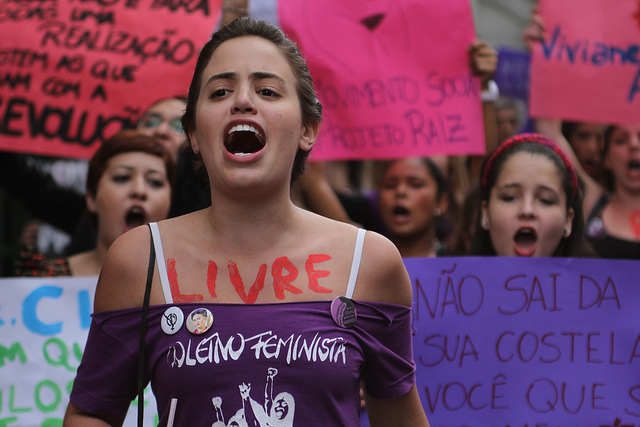The class, race and age of activists in Brazilian social movements is becoming more diverse
Social movements have become increasingly important form of participation in democracy, beyond the traditional means of joining political parties and fighting elections. This is evident in Brazil, where large street protests on a number of issues have featured people from a range of backgrounds. In this audio interview, Cheryl Brumley spoke to Marilia Pontes Esposito and Raquel Sousa of the University of São Paolo to discover more about the trend.

A demonstrator on a SlutWalk protest in Brazil. Credit: William Droops (CC BY-NC-SA 2.0)
Listen to the interview here:
Democratisation took place in Brazil in 1985, after more than two decades of military dictatorship. It is clear this period still casts a shadow over Brazilian society, although we have also seen vociferous social movements emerging across the country as people take advantage of, and seek to strengthen, their democratic rights. The current President Dilma Rousseff was herself involved with guerilla groups fighting the military government in the 1960s and 197os.
Tensions have been played out on the streets of Brazil’s cities, including in the widespread rioting since 2013. Protests began in response to public transport fare increases, but have drawn in other issues including police brutality and the costs of staging both the 2014 football world cup and the 2016 Olympic Games.
In this interview, Marilia Pontes Esposito and Raquel Sousa explore the role and composition of social movements in Brazil. They suggest that the participants have changed since democratisation, with younger and poorer people more likely to take part, as well as the highly-educated middle class. Social movements have not necessarily supplanted political parties in the democratic process, but do allow people to participate differently.
For instance, some movements have an expressive dimension rather than specific political demands, such as the SlutWalk marches. The structure of social movements also differs from traditional political groups, with a move away from hierarchy toward horizontal organisation, with flexible leaderships.
Marilia Pontes Esposito is a Professor of the Sociology of Education and Raquel Sousa a doctoral candidate at the University of São Paolo.
Download the edited transcript of this interview here.
The LSE Review of Books has launched a three-part podcast series on LSE’s research impact in Brazil. Cheryl Brumley travelled to Rio and São Paulo at the end of last year to speak to academics and policymakers in the country about research on topics ranging from favelas, city transformations, and leftist politics. Catch the latest episode below, or listen to all episodes here.
Episode 2: Favela Life: From Drug Gangs to Drum Beats
Featuring Sandra Jovchelovitch, Jacqueline Priego-Hernandez, Paul Heritage, Silvia Ramos, Celso Athayde and others.
Produced by Cheryl Brumley. Contributors: Marilia Pontes Esposito, Raquel Sousa. Voiceovers done by: Cheryl Brumley and Amy Mollett. Music: Podington Bear (Daydream Heartbeat) via the Free Music Archive. Text introduction by Richard Berry.
Note: This post and interview reflect the views of the authors and contributors, and do not give the position of LSE or Democratic Audit. Please read our comments policy before responding. Shortlink for this post: buff.ly/1p22Ovn





 Democratic Audit's core funding is provided by the Joseph Rowntree Charitable Trust. Additional funding is provided by the London School of Economics.
Democratic Audit's core funding is provided by the Joseph Rowntree Charitable Trust. Additional funding is provided by the London School of Economics.
The class, race and age of activists in Brazilian social movements is becoming more diverse : Democratic Audit UK https://t.co/vyyBr4zTYQ
New on DA today: The class, race and age of activists in Brazilian social movements is becoming more diverse https://t.co/aX9hTHJbHu
The class, race and age of activists in Brazilian social movements is becoming more diverse https://t.co/QO1NxMErV8
The class, race and age of activists in Brazilian social movements is becoming more diverse https://t.co/713n6MdYUe